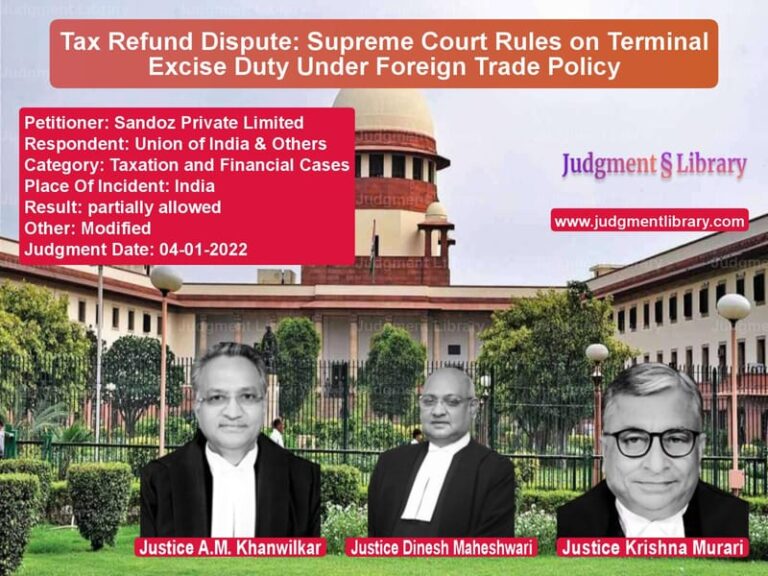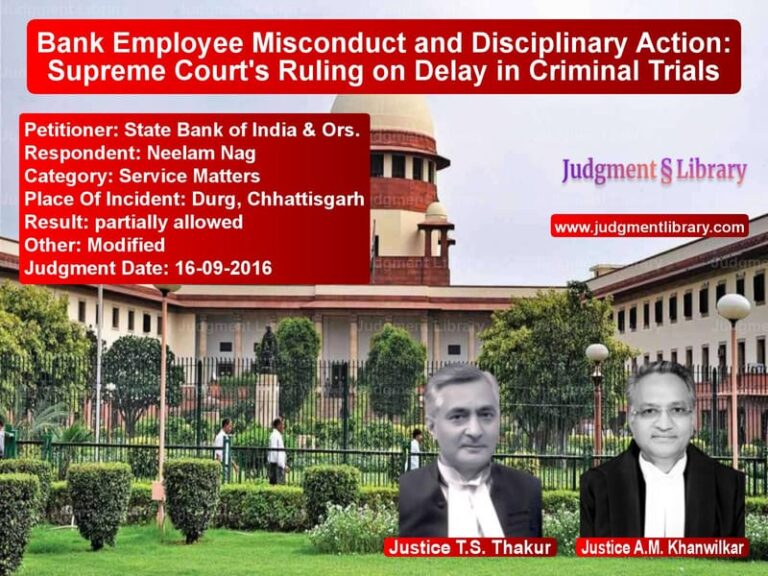Retrospective Applicability of Tax Rules: Supreme Court Clarifies Rule 8D in Section 14A Cases
The Supreme Court of India, in its judgment in Commissioner of Income Tax 5 Mumbai vs. M/S. Essar Teleholdings Ltd., addressed a significant legal question regarding the retrospective application of Rule 8D under Section 14A of the Income Tax Act. The ruling clarified whether Rule 8D, which prescribes a method for calculating expenditure related to exempt income, should be applied retrospectively or only prospectively.
Background of the Case
The dispute arose when the Commissioner of Income Tax challenged the Bombay High Court’s ruling that Rule 8D of the Income Tax Rules, introduced in 2008, could only be applied prospectively. The key issue was whether Rule 8D could be used to reassess prior years’ tax returns, even before its introduction. The case had wide implications for taxpayers and tax authorities, as it directly affected the calculation of expenses related to tax-exempt income.
The appeal was filed against the judgment of the Bombay High Court dated 12.09.2011, which had dismissed the Revenue’s appeal, relying on the earlier decision in Godrej & Boyce Manufacturing Co. Ltd. vs. Deputy Commissioner of Income Tax. The Supreme Court was tasked with deciding whether Rule 8D, introduced in 2008, had retrospective applicability or only applied from the assessment year 2008-09 onward.
Key Legal Issues
- Did Rule 8D of the Income Tax Rules apply retrospectively to past assessments?
- Was the amendment to Section 14A clarificatory or substantive in nature?
- Could the Revenue apply Rule 8D to tax assessments from periods before its introduction?
Arguments by the Petitioner (Revenue)
The Commissioner of Income Tax argued that:
- Section 14A, which disallows deductions for expenses incurred in earning tax-exempt income, was always intended to apply retrospectively.
- Rule 8D was merely a clarificatory rule providing a methodology for computation, making it automatically applicable to all pending cases.
- The retrospective application of Rule 8D was necessary to prevent tax evasion and ensure consistency in the treatment of expenses related to tax-free income.
- The legislature had not explicitly stated that Rule 8D was only prospective, implying that it should apply to previous years as well.
Arguments by the Respondent (Essar Teleholdings Ltd.)
The respondent, Essar Teleholdings Ltd., opposed the retrospective application of Rule 8D, arguing that:
- Rule 8D was introduced in 2008 and should not be applied to prior years when it did not exist.
- The Revenue’s argument that it was a procedural provision did not hold, as it created a new liability for taxpayers.
- Retrospective tax laws create uncertainty and violate the principle of fairness, as businesses had no prior knowledge of the rule’s existence.
- The Bombay High Court had correctly interpreted the law by restricting the application of Rule 8D to the financial year 2008-09 and onwards.
Supreme Court’s Observations
The Supreme Court carefully examined the legislative history of Section 14A and the introduction of Rule 8D. It noted that:
- Rule 8D was introduced through the Income Tax (Fifth Amendment) Rules, 2008, and was not included in the original Section 14A framework.
- When Rule 8D was introduced, the Finance Act 2006 had already amended Section 14A to include sub-sections (2) and (3), which provided for a prescribed methodology for calculating disallowable expenses.
- The explanatory memorandum to the Finance Bill, 2006, explicitly stated that the amendments would apply from the assessment year 2007-08 onward.
- The government’s own circulars had indicated that Rule 8D would be applied prospectively.
Supreme Court’s Judgment
The Supreme Court ruled in favor of the respondent, holding that Rule 8D could only be applied prospectively. The key findings of the Court were:
- “Applying the principles of statutory interpretation, we hold that Rule 8D is prospective in operation and cannot be applied to any assessment year before 2008-09.”
- “The explanatory memorandum issued with the Finance Bill, 2006, clearly indicates that the department itself understood that sub-section (2) and (3) of Section 14A were meant to be applied from assessment year 2007-08 onward.”
- “Retrospective application of Rule 8D would create fresh liabilities for past assessment years, which is not permissible in tax law unless expressly stated.”
- “The High Court was correct in relying on the Godrej & Boyce judgment, which had already determined that Rule 8D was not retrospective.”
Key Legal Precedents Considered
During the hearing, the Supreme Court referred to several important tax law precedents, including:
- Godrej & Boyce Manufacturing Co. Ltd. vs. Deputy Commissioner of Income Tax (2010) 328 ITR 81 (Bom): This ruling had already established that Rule 8D is not retrospective.
- Commissioner of Income Tax vs. Vatika Township Pvt. Ltd. (2015) 1 SCC 1: A Constitution Bench ruling that established the principle that tax provisions should generally be applied prospectively unless the law explicitly states otherwise.
- R.C. Tobacco Pvt. Ltd. vs. Union of India (2005) 7 SCC 725: This case reinforced the principle that retrospective tax laws must be fair and cannot impose undue hardship.
Implications of the Judgment
The Supreme Court’s decision in this case has significant consequences for tax law in India. The ruling:
- Provides clarity on the applicability of Rule 8D, preventing its misuse for reassessing past cases.
- Reaffirms the principle that tax laws must be explicit about their retrospective or prospective nature.
- Ensures certainty for taxpayers, preventing arbitrary re-opening of settled assessments.
- Strengthens judicial oversight over the retrospective application of tax provisions.
Conclusion
The Supreme Court’s judgment in Commissioner of Income Tax 5 Mumbai vs. M/S. Essar Teleholdings Ltd. is a landmark ruling that provides much-needed clarity on the retrospective application of tax rules. The decision upholds taxpayer rights and prevents undue hardships caused by retrospective taxation. The judgment serves as a guiding principle for interpreting tax provisions, reinforcing the need for clear legislative intent when introducing new tax laws.
Don’t miss out on the full details! Download the complete judgment in PDF format below and gain valuable insights instantly!
Download Judgment: Commissioner of Inco vs MS. Essar Teleholdi Supreme Court of India Judgment Dated 31-01-2018.pdf
Direct Downlaod Judgment: Direct downlaod this Judgment
See all petitions in Income Tax Disputes
See all petitions in Tax Refund Disputes
See all petitions in Judgment by Ashok Bhushan
See all petitions in Judgment by A.K. Sikri
See all petitions in dismissed
See all petitions in supreme court of India judgments January 2018
See all petitions in 2018 judgments
See all posts in Taxation and Financial Cases Category
See all allowed petitions in Taxation and Financial Cases Category
See all Dismissed petitions in Taxation and Financial Cases Category
See all partially allowed petitions in Taxation and Financial Cases Category







